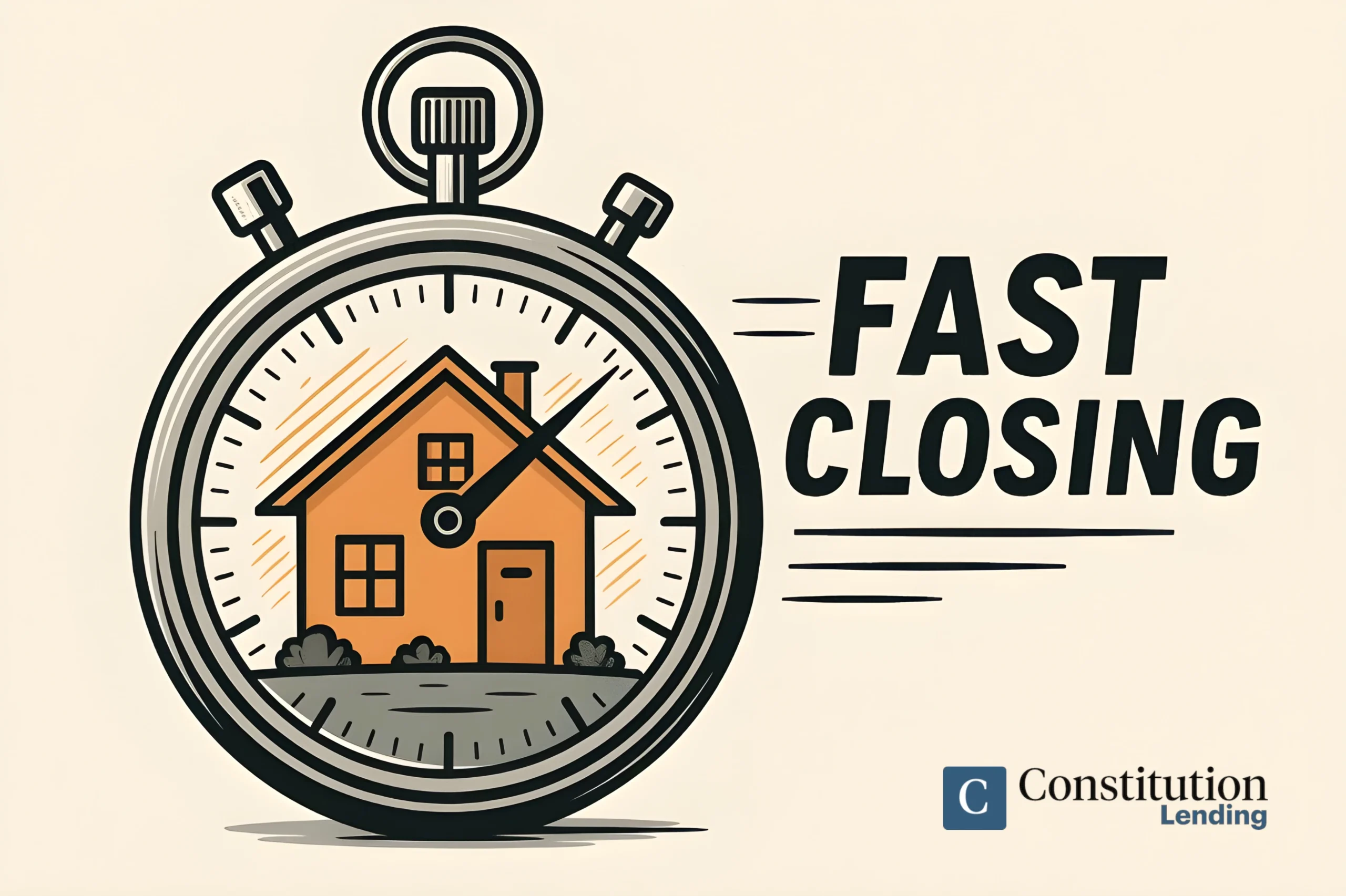When you’re buying an investment property, choosing where to line up financing matters as much as choosing the property itself. Pick the wrong lender and you’ll miss out on deals, waste weeks in underwriting, or worse, get declined three days before closing.
The first decision you need to make is whether to work with a direct lender or a mortgage broker. Most investors don’t understand the difference until they’ve already made a costly mistake.
According to the Consumer Financial Protection Bureau, a lender is a financial institution that makes direct loans, while a broker does not lend money but helps you find multiple lenders.
For investment properties specifically, this distinction becomes even more important because speed and certainty often matter more than getting the absolute lowest rate. Investment property lenders typically specialize in investor-friendly loan products like debt service coverage ratio (DSCR) loans and fix-and-flip financing, which are designed to close faster than traditional mortgages.
This guide breaks down exactly what separates direct lenders from brokers, when each makes sense, and how to choose the right option for your investment strategy.
What is a Direct Lender?

A direct lender uses their own money to fund your loan. They make the lending decisions, set their own requirements, and control the entire process from application to closing.
When you apply with a direct lender, you’re talking to the people who will actually finance your deal. They review your application, underwrite it themselves, and fund the loan from their own accounts. There’s no middleman.
Direct lenders include banks, credit unions, and private lending companies. For investment properties, you’re usually looking at specialized private lenders since most banks aren’t set up to serve real estate investors.
When considering your financing options for real estate ventures, understanding what makes a smart investment choice can help guide your lending decisions as well. The main advantage is certainty. If a direct lender says you’re approved, you’re approved. They’re not waiting for someone else to review your file or discover a problem their loan officer missed.
Direct lenders also tend to close faster because they don’t need to coordinate with third parties. Everything happens in-house. Some can close in 7 to 14 days, which matters when you’re competing against cash buyers.
The tradeoff is that you only get one set of loan terms. Direct lenders offer what they offer. If their rates don’t work for you, you need to apply somewhere else.
NerdWallet notes that working directly with a lender gives you more control over the process, and for investment properties where time is critical, this control often outweighs the potential benefits of broker shopping.
What is a Mortgage Broker?

A mortgage broker doesn’t lend you money. They’re a middleman who connects you with lenders willing to fund your deal.
Think of brokers as matchmakers. You tell them what you need, they shop your application around to multiple lenders, and they try to find someone willing to approve you at decent terms.
Brokers make money by charging fees or earning a commission from the lender who funds your loan. They have relationships with dozens of lenders, which in theory gives you more options.
The pitch sounds good. Why wouldn’t you want someone shopping your deal to 30 different lenders to find the best rate?
Here’s the problem. Brokers can’t actually approve your loan. They can tell you that you’ll probably get approved based on what they see in your application, but they don’t know for sure until the actual lender finishes underwriting.
If the lender finds something the broker missed or overlooked, your loan can get rejected after weeks of waiting. This happens more often than brokers want to admit.
Brokers also add time to the process. Every communication between you and the lender goes through the broker. Documents get passed back and forth. Questions take longer to answer. What should take two weeks stretches into six.
The other issue is that brokers work with so many different lenders that they can’t possibly know all the requirements for each one. They make educated guesses about whether you’ll qualify, but guesses aren’t guarantees.
How the Application Process Differs
The application process reveals the biggest practical differences between direct lenders and brokers.
- With a direct lender, you submit your application directly to the people making the decision. You upload documents to their portal. You talk to their underwriters. You get answers quickly because there’s no telephone game. Good direct lenders have automated systems that give you instant quotes and immediate preapproval. You can see exactly what you qualify for without waiting days for a loan officer to call you back.
- With a broker, you submit everything to the broker first. They review it, package it up, and send it to potential lenders. Then you wait while those lenders review it on their own timeline. The broker might come back with multiple options, which sounds great until you realize you still don’t know if you’re actually approved. You’re prequalified at best, which means almost nothing.
Once you choose an option, the broker submits your full application to that lender. Now the real underwriting starts. This is when problems surface. The lender might have different requirements than the broker understood. They might calculate your debt-to-income (DTI) ratio differently. They might require additional documentation the broker didn’t mention.
Each back-and-forth adds days or weeks to your closing timeline. If you’re trying to close in 14 days to match a cash offer, working with a broker makes that nearly impossible.
Understanding Underwriting Control
Underwriting is where loans get approved or rejected. Understanding who controls this process tells you everything about working with direct lenders versus brokers.
Direct lenders do their own underwriting. They have a team of underwriters on staff who review applications according to the lender’s guidelines. If something looks questionable, the underwriter can walk down the hall and talk to the loan officer or even the decision maker.
This internal communication means problems get solved quickly. If your property’s rental income is slightly below their normal threshold, they can discuss it and potentially make an exception. Everything happens inside one company.
Brokers send your application to a third-party lender for underwriting. That lender has no relationship with you. They’ve never talked to you. They’re just reviewing documents the broker sent over.
If the underwriter has questions, they email the broker. The broker emails you. You email back. The broker emails the underwriter. This game of telephone takes days for each exchange.
Worse, the underwriter has zero flexibility. They’re following their company’s guidelines exactly as written. If you don’t fit the formula perfectly, you get rejected. There’s no conversation, no exception, no understanding of your specific situation.
This is why loans fall through at the last minute with brokers. The broker thought you qualified based on their understanding of the lender’s rules. But the actual underwriter interpreted those rules differently or found something the broker missed.
By the time this happens, you’re a week from closing. You’ve already spent money on inspections and appraisals. You might lose your earnest money deposit. And you definitely lose the deal.
Closing Speed and Reliability

For investment properties, closing speed often matters more than getting the absolute lowest interest rate. Good deals move fast. If you can’t close quickly, someone else will.
Direct lenders can close in 7 to 14 days when they have efficient systems. The fastest ones have automated quote systems, online document portals, and in-house underwriting teams.
You can tell if a direct lender is actually fast by how quickly they give you a quote. If you can get an instant quote online, they can probably close fast. If you have to wait three days for a loan officer to call you back, expect a 45‑day closing.
Brokers almost never close in under 30 days. The coordination between broker and lender just takes time. Even if the lender could close quickly, adding the broker layer slows everything down.
The bigger issue with brokers is reliability. You don’t know if you’re actually approved until very late in the process. Direct lenders tell you upfront if there’s a problem. Brokers tell you everything looks good until suddenly it doesn’t.
This uncertainty kills deals. Sellers want to know you can actually close. If you’re using a broker, there’s always doubt. Smart sellers will take a slightly lower offer from someone using a direct lender because they know that deal will actually close.
Cost Differences
Direct lenders and brokers structure their fees differently, which can make comparing them confusing.
- Direct lenders charge origination fees, typically 1% to 3% of the loan amount. This fee covers their cost of underwriting and funding your loan. It’s straightforward and disclosed upfront. Brokers charge broker fees, usually 1% to 2% of the loan amount. This is their commission for connecting you with a lender. But here’s the catch: the lender also charges their own origination fee on top of the broker fee.
- Brokers charge broker fees, usually 1% to 2% of the loan amount. This is their commission for connecting you with a lender. But here’s the catch: the lender also charges their own origination fee on top of the broker fee.
So you’re paying two sets of fees. The broker’s fee and the lender’s fee. Brokers will argue they’re saving you money by finding better rates, but once you add up all the fees, you’re often paying more than you would with a direct lender.
The other hidden cost with brokers is time. Every day your money is tied up in a deal that isn’t closing costs you money. You might be paying rent elsewhere, losing out on other opportunities, or just sitting on cash that could be earning returns.
If a broker takes 45 days to close instead of a direct lender’s 14 days, that’s an extra month of carrying costs. For a $300,000 property, that could easily cost you $3,000 to $5,000 in lost opportunity.
When Brokers Make Sense
Brokers aren’t always the wrong choice. There are specific situations where working with a broker makes sense.
- If you have a complicated financial situation that doesn’t fit standard lending guidelines, a broker’s network might help. Maybe you’re self-employed with irregular income, or you’ve had credit issues in the past, or you’re trying to finance a unique property type. Brokers work with dozens of lenders, including some that specialize in difficult situations. They might be able to find someone willing to work with you when direct lenders turn you down.
- If you’re not in a rush to close, the extra time a broker takes might not matter. Maybe you’re refinancing an existing property and the closing date is flexible. In that case, shopping around through a broker could potentially save you money on your rate.
- If you’re buying a property that requires owner-occupancy or traditional financing, brokers often have better access to conventional mortgages. Direct lenders who specialize in investment properties might not offer the loan products you need.
But for pure investment property purchases where you need to close quickly and compete with cash buyers, direct lenders are usually the better choice.
When Direct Lenders Make Sense
Direct lenders make the most sense in most investment property scenarios.
- If you’re buying a rental property and need to close in under 30 days, use a direct lender. The speed and certainty matter more than potentially saving 0.25% on your rate.
- If you’re competing against cash offers, direct lenders give you the best chance of winning. Sellers know direct lender approvals are real, while broker pre-qualifications are just educated guesses.
- If you’re self-employed or have a high debt-to-income ratio, look for direct lenders who specialize in DSCR loans. These loans qualify you based on the property’s rental income, not your personal income.
- For those just getting started, learning about different real estate investing strategies can help you understand which financing approach aligns with your investment goals.
- If you’re building a portfolio and plan to buy multiple properties, establishing a relationship with a direct lender pays off. They already know your situation, they’ve already approved you once, and repeat deals close even faster.
- Understanding the broader context of commercial real estate considerations can also inform your approach to residential investment financing, as many of the due diligence principles apply across property types.
- If you value knowing exactly where you stand, direct lenders provide that certainty. You’re either approved or you’re not. There’s no gray area, no surprises three days before closing.
Red Flags to Watch For

Whether you’re working with a direct lender or broker, certain red flags tell you to walk away.
- If they can’t give you a quote within 24 hours, they’re not efficient enough to close quickly. Good lenders have automated systems. If you’re waiting days for a loan officer to manually calculate numbers, expect delays throughout the process.
- If they can’t clearly explain whether they’re a direct lender or broker, that’s a problem. Some brokers try to make it sound like they’re direct lenders. Ask explicitly: Are you funding this loan with your own money? If they dodge the question, they’re a broker.
- If they promise rates that sound too good to be true, they probably are. Investment property loans carry higher rates than primary residence loans. If someone is quoting you conventional mortgage rates for an investment property, they either don’t understand what you’re asking for or it’s a bait‑and‑switch.
- If they require extensive personal financial documentation for a DSCR loan, something’s wrong. DSCR loans specifically exist to avoid personal income verification. If a lender claiming to offer DSCR loans is asking for two years of tax returns, they don’t actually understand their own product.
- If they won’t give you references or have no online reviews, proceed carefully. Legitimate lenders have track records. They should be able to point you to recent clients or show you testimonials from investors they’ve funded.
How to Choose the Right Option
Start by being honest about your timeline and priorities. If you absolutely need to close in 14 days, you need a direct lender. If you have 60 days and want to shop around, a broker might work.
- Ask about their typical closing time, not their fastest closing time. Anyone can close fast when everything goes perfectly. You want to know their average timeline with normal complications.
- Ask if they’re a direct lender or broker. If they’re a broker, ask how many lenders they’re working with and what happens if the first lender rejects you.
- Get quotes from multiple sources. Apply with two direct lenders and maybe one broker. Compare not just the rates but the total costs, closing timeline, and how responsive they are.
- Look at their application process. Can you get an instant quote online? Do they have a document portal where you can upload everything at once? Or are you emailing documents back and forth with a loan officer?
- Check their reviews. Not just the star rating but the actual content of reviews. Are people complaining about last-minute rejections? Missed closing dates? Poor communication? These patterns tell you what to expect.
Bankrate’s comparison guide suggests looking at the full picture of fees, rates, and service quality rather than focusing solely on advertised rates, which is especially important for investment property loans where terms can vary significantly.
Trust your gut about responsiveness. If they’re slow to respond during the application process, they’ll be slow throughout closing. The loan officer who takes three days to answer your email now will take three days to answer the title company’s questions later.
Making the Decision
For most real estate investors buying rental properties, direct lenders are the better choice. The speed, certainty, and simplicity outweigh any potential savings from broker rate shopping.
Brokers serve a purpose for complicated situations or borrowers who don’t fit standard lending boxes. But if you’re a straightforward investment property buyer, adding a broker to the mix usually just adds time and uncertainty.
The key is understanding what you actually need. If you need speed and reliability, prioritize that over rates. If you need flexibility because your situation is complicated, a broker’s network might help.
Whatever you choose, make the decision based on facts about their process, not marketing promises about rates or closing speed. Ask hard questions, get clear answers, and pick the option that gives you the best chance of actually closing your deal.